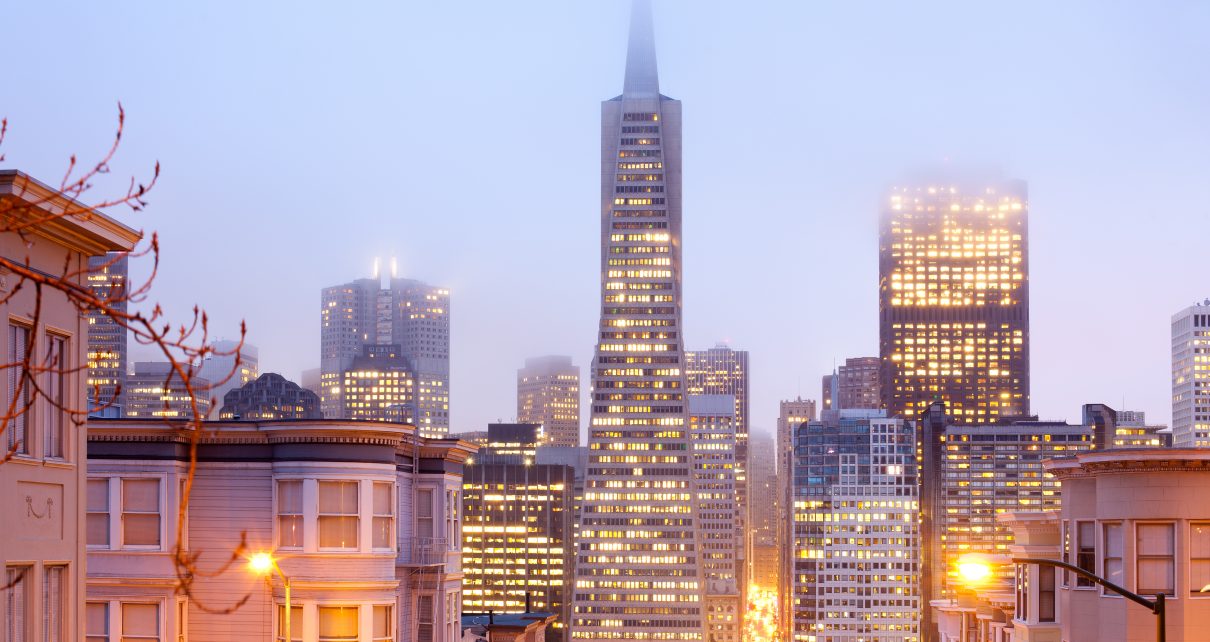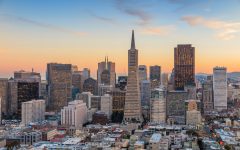
Skyline of Financial District at dusk, San Francisco, CA. (Photo: Jose Luis Stephens/ Shutterstock)
BART Survey Finds Only 17% Of Users Feel Safe While Riding
73% of Bay area residents also want more police on trains
By Evan Symon, May 11, 2023 12:23 pm
According to a new Bay Area Council/EMC Research poll released this week, only 17% of people in the Bay Area who ride Bay Area Rapid Transit (BART) feel safe, with 45% of residents saying that they don’t take BART because they don’t feel safe when riding it.
The survey, which was conducted last month, specifically found that the top responses to the question “What is the main thing that keeps you from riding BART more often than you are now, if anything?” were 22% citing Safety concerns/Dangerous/Lack of security/Fear, followed by 16% saying No need/No commute/Retired/Don’t go to SF. Overall, 45% cited a safety issue of some sort.
This was followed by a whopping 78% of respondents saying they would ride more if it was significantly cleaner and safer to ride, with 83% of respondents wanting BART to remove people from the system when they break the rules, such as fare jumpers, those who drink or take drugs, and the homeless who stay on trains. Bay area residents also want more police on trains, with 73% saying they want more, and 72% saying that they feel safer when a BART officer is on board.
Most shocking is the finding that only 17% of frequent BART riders feel safe on the transit system, with 87% of frequent riders saying that the word ‘safe’ does not describe the word in it’s current form. Out of the descriptors Easy to use, Fast, Convenient, Reliable, Affordable, Safe, and Clean, the only ones scoring above even a 60% positivity were Easy to use and Fast, with all others scoring with more negative responses.
“People are hesitating to get back on board because they have fear,” said Bay Area Council CEO Jim Wunderman earlier this week on the survey. “They don’t want to experience these conditions. If they feel safe and secure, we are going to see people come back to the system,
Due in large part to the crime and safety issues of BART, as well as a large drop in commuters due to fewer people working in Downtown areas because of the rise of remote working and office buildings in the city now reporting an average of 30% vacancy rates, ridership has fallen dramatically. Before the COVID-19 pandemic in 2019, around 400,000 rode BART every week. In 2023, ridership is only around 100,000-150,000 per week.
Multiple other factors have led to the decline of BART and low safety scores there. A growing number of businesses leaving or closing in the area due to crime and safety concerns, a shortage of SFPD officers, a crime rate that refuses to go down, a system where few criminals are prosecuted, and the end of the tech boom in the area have all played a role, along with other factors ranging from a growing drug problem to a 35% increase in the number of homeless people in San Francisco since 2019.
BART increases police presence due to safety issues
“BART PD launched a redeployment plan in March that has dramatically increased the number of officers on our trains. We now have an additional 8 to 18 officers patrolling trains per shift,” said BART in a statement. “That visible safety presence is making a difference. From the first day of the new deployment plan through April 16th, about a full month, the BART Police Department recorded a 38% decrease in calls for service and a 40% increase in arrests.”
“For the longest time BART had a pretty good reputation,” public transit safety consultant Richard Reyes told the Globe on Thursday. “I mean, BART was seen as quick, easy to use, and most surprising to visitors, comfortable. I mean, padded seats everywhere? What’s not to love?”
“But then as the area declines, so did BART’s reputation. The Oscar Grant shooting in 2009 in one of the stations kind of started it off, but you have really noticed it in recent years. Beyond the usual complains in systems like homeless people, BART saw a huge jump in crime, and people didn’t want to ride it anymore. When people started working from home, they said that not taking BART was a plus. People who left the city said New York and LA and Chicago had better transit systems. And look, the New York subway has a huge homeless problem, and the LA Metro has had many female riders leave in recent years because they didn’t feel safe. And people still think they are better than BART in comparison. That is telling. You’re making people not want to take public transportation in one of the most liberal places in the country. That’s almost impressive if it wasn’t horrific.”
“BART needs to do a lot more. They have a good start with the increase in officers. But they need to start to institute higher fines or banning people or something more. It was a great system, and they need to bring that back. It’s just hard to do with how San Francisco is now.”
Additional BART safety surveys are expected later this year as police presence increases within the system.
- Bill to Require Law Enforcement Disclosure if AI Was Used To Help Write Reports - August 7, 2025
- Gov. Newsom Files FOIA Request To ‘Expose True Cost’ Of L.A. Federal Troop Deployment for Anti-ICE Riots - August 6, 2025
- California Redistricting: How Newsom’s Plan Will Demolish Hard Fought GOP Gains - August 6, 2025




Judging from the empty seats on Sacramento’s light rail, it’s possible that Sacramentans have similar feelings about their mode of public transit.